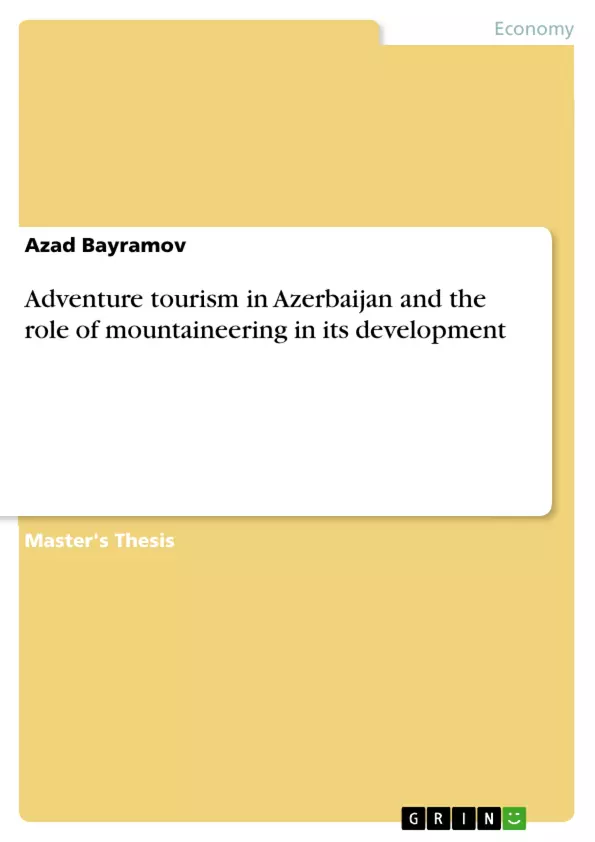The present research focused on exploring the concept of mountaineering as adventure tourism, analysing the development of mountaineering in Azerbaijan, determining the main challenges to the development of mountaineering as adventure tourism in Azerbaijan, and defining the role of mountaineering in developing adventure tourism.
Over recent years, due to the increasing popularity of mountain-based tourism, the role of mountaineering has increased in importance.
The mountains have for centuries served as a principal attraction, enticing tourists to visit particular vacation destinations. Mountains continue to be one of the core features of adventure tourism. Mountains cover one-fifth of the earth’s land surface and continue to market themselves, in a way, as destinations with a clean environment, a variety of flora and fauna, and beautiful nature. The case study location chosen for this research was Azerbaijan, a country near the Great Caucasus Range and Caspian Sea. Azerbaijan is a country primarily covered by mountains that have a high potential for adventure tourism.
Inhaltsverzeichnis (Table of Contents)
- Chapter One - Introduction
- Introduction
- Statement of the problem
- Research question and study objectives
- Research question
- Objectives
- Organisation of the thesis
- Chapter Two - Literature Review
- Introduction
- Adventure tourism and its diversification
- Importance of mountains in tourism development
- The economic importance of mountain tourism
- Mountains as adventure destination
- Trends in developing mountaineering as adventure tourism
- Geographical development of mountaineering by regions and countries
- Conclusions
- Chapter Three – Methodology
- Introduction
- Defining Research
- Research Focus, Aims and Objectives
- Research aims/Goals
- Research objectives
- Research Hypotheses
- Rationale for Using Qualitative Research
- Research Design
- Secondary Research
- Primary Research
- Sample Selection
- Questionnaire Design
- Validity, Reliability and Trustworthiness
- Internal Validity
- External Validity
- Research Ethics
- Informed and Voluntary Consent
- Data Analysis
- Limitations of Research
- Conclusion
- Chapter Four – Research Findings
- Introduction
- Qualitative research: interviews
- The geographical distribution of mountaineering in Azerbaijan
- Mountaineering seasons in Azerbaijan
- Attractiveness of mountaineering and outdoor activity
- Tourists' preferences
- Current state of mountaineering as adventure tourism
- The role of governmental and non-governmental agencies in developing mountaineering as adventure tourism
- Dependence between mountaineering and other types of adventure tourism
- Qualitative research: interviews
Zielsetzung und Themenschwerpunkte (Objectives and Key Themes)
This dissertation examines the role of mountaineering in developing adventure tourism in Azerbaijan. The main objective of this research is to investigate the potential of mountaineering as a form of adventure tourism in Azerbaijan and explore how it can be further developed. The research aims to identify the main challenges to the development of mountaineering as adventure tourism in Azerbaijan and define the role of mountaineering in developing adventure tourism in general.
- The importance of mountaineering as a form of adventure tourism
- The challenges and opportunities for developing mountaineering tourism in Azerbaijan
- The role of government and non-governmental agencies in promoting mountaineering tourism
- The potential for collaboration between mountaineering and other forms of adventure tourism
- The economic and social impacts of mountaineering tourism in Azerbaijan
Zusammenfassung der Kapitel (Chapter Summaries)
Chapter One provides an introduction to the research, outlining the problem statement, research question, and objectives. It also presents the structure of the dissertation. Chapter Two reviews the existing literature on adventure tourism, the importance of mountains in tourism development, and the economic significance of mountain tourism. It also examines trends in developing mountaineering as adventure tourism and geographical development of mountaineering by regions and countries. Chapter Three outlines the methodology used in the research, including the research design, data collection methods, and data analysis techniques. Chapter Four presents the research findings, based on interviews with stakeholders in the mountaineering tourism sector in Azerbaijan. The findings cover various aspects of mountaineering tourism, including its geographical distribution, seasons, attractiveness, tourist preferences, current state, and the role of governmental and non-governmental agencies in its development.
Schlüsselwörter (Keywords)
The main keywords and focus topics of this dissertation include adventure tourism, mountaineering, Azerbaijan, tourism development, mountain tourism, economic importance, challenges, opportunities, government agencies, non-governmental agencies, collaboration, economic impacts, and social impacts.
Frequently Asked Questions
What is the potential for adventure tourism in Azerbaijan?
Azerbaijan has high potential due to its geographical location near the Great Caucasus Range and the Caspian Sea, offering diverse landscapes and mountains suitable for outdoor activities.
What role does mountaineering play in Azerbaijan's tourism development?
Mountaineering is a core feature of adventure tourism in the country, attracting visitors interested in clean environments, biodiversity, and challenging outdoor experiences.
What are the main challenges for mountaineering tourism in Azerbaijan?
The research identifies challenges such as infrastructure needs, the role of governmental support, and the necessity for better collaboration between various tourism agencies.
When is the best season for mountaineering in Azerbaijan?
The dissertation analyzes specific mountaineering seasons based on the local climate and mountain conditions to determine optimal times for tourists.
How does mountaineering impact the local economy?
Mountain tourism contributes to economic diversification, providing jobs in rural areas and promoting Azerbaijan as a global adventure destination.
- Quote paper
- Azad Bayramov (Author), 2014, Adventure tourism in Azerbaijan and the role of mountaineering in its development, Munich, GRIN Verlag, https://www.grin.com/document/341944



